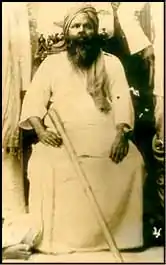Subramaniya Siva
Subramaniya Siva (4 October 1884 – 23 July 1925) was an Indian freedom fighter, writer and pure Tamil movement activist during the Indian independence movement.[3]
Subramaniya Siva | |
|---|---|
 Portrait of Subramaniya Siva | |
| Born | 4 October 1884[1] |
| Died | 23 July 1925 (aged 40)[2] |
| Nationality | Indian |
Life
Subramaniya Siva was born in an Brahmin Iyer[4] family at Batlagundu near Dindigul in erstwhile Madurai district of Madras presidency. He was born to Rajam Iyer. He joined the Indian freedom movement in 1908.
In 1908, he was arrested by the British and was the first political prisoner in Madras jail. While serving a prison term, he was afflicted by leprosy and was shifted to Salem jail. Since leprosy was regarded as a contagious disease, the British authorities forbade him to travel by rail after his release and hence he was forced to travel on foot. He continued to fight for independence and was incarcerated many times until 1922.[1] He was the author of the journal Jnanabhanu and books Ramanuja Vijayam and Madhva Vijayam.[3]
Pure Tamil Movement
A movement started by Maraimalai Adigal, the Tanittamil (‘pure Tamil’) literary movement intended to rid the Tamil language of non-Tamil words. The movement was supported & propagated by Subramaniya Siva and is one of the most significant of all Tamil revivalist movements organised by nationalists.
His passion for Tamil was such that he wrote an advertisement which was published in Gnanabhanu as:
‘Five rupees’ — “Can you write pure Tamil? If so, rush in. A lover of Tamil has come forward to offer five rupees (as a prize) for anyone who writes, not less than eight pages on the history of St. Tiruvalluvar in our Gnanabhanu, which uses only pure Tamil words with no mixtures of words from other languages like Sanskrit.”[4]
Honours
The office of Dindugal district collector is named after as Thiagi Subramania Siva Maaligai after him. Bathlagundu bus stand is named after Siva. A memorial has been established at Papparapatti near Pennagaram in Dharmapuri district.[5]
References
- "Subramania Siva". tamilnation.co. Retrieved 19 September 2015.
- "125th Birth anniversary of Subramaniya Siva celebrated". The Hindu. 15 October 2008.
- "Eminent personalities - Dharmapuri district". Government of Tamil Nadu. Retrieved 19 September 2015.
- https://theprint.in/theprint-profile/subramaniya-siva-tamil-nationalist-who-fought-for-purity-in-the-language/266635/#:~:text='Pure%20Tamil'&text=Born%20on%204%20October%201884,of%20Tamils%20will%20be%20lost%E2%80%9D.
- "Memorial for Subramania Siva". The Hindu. 10 February 2010.